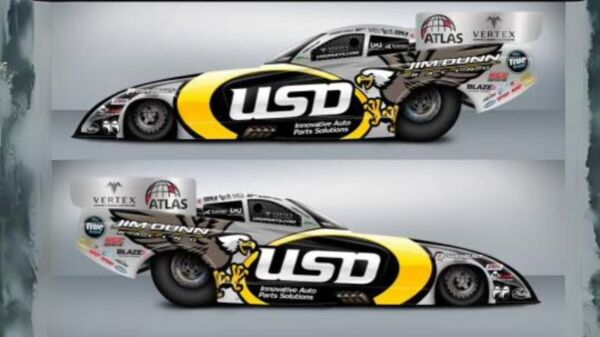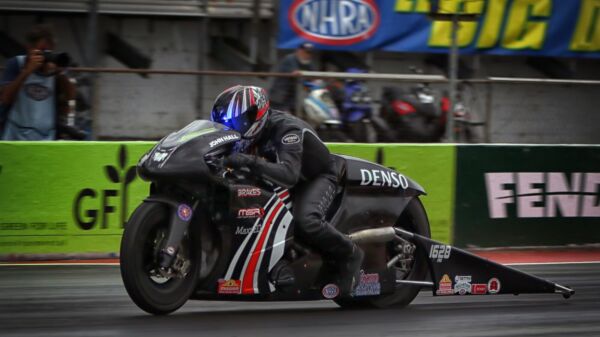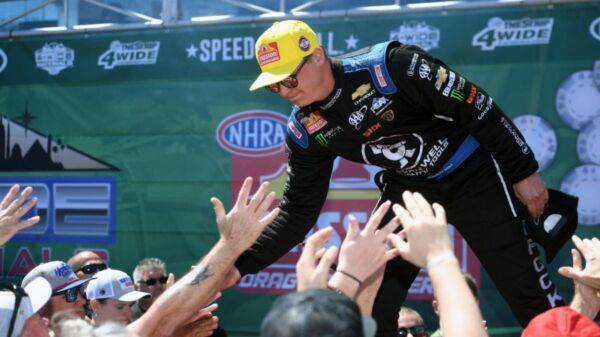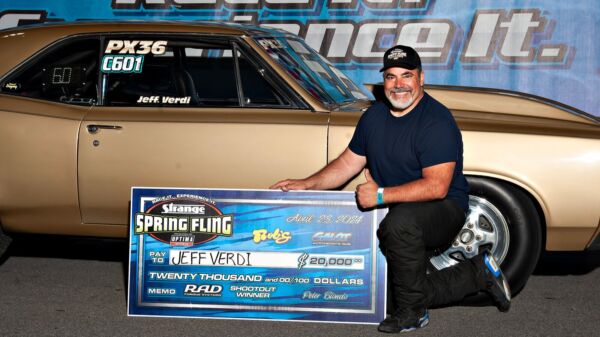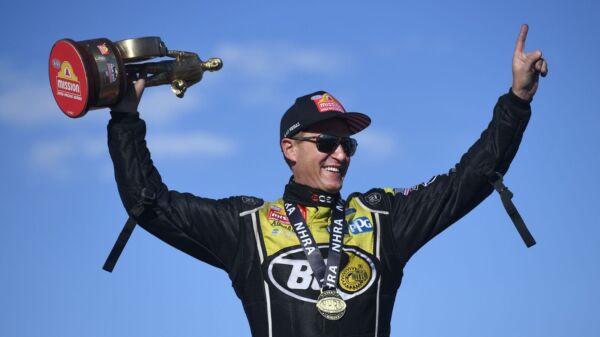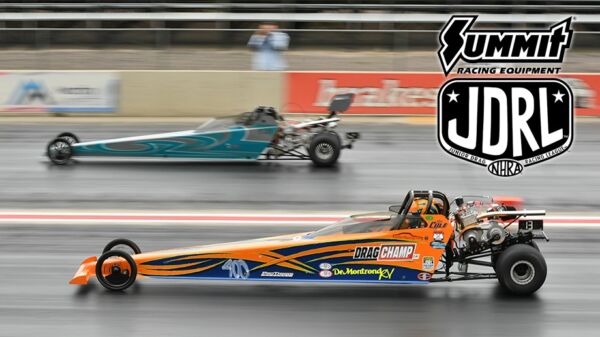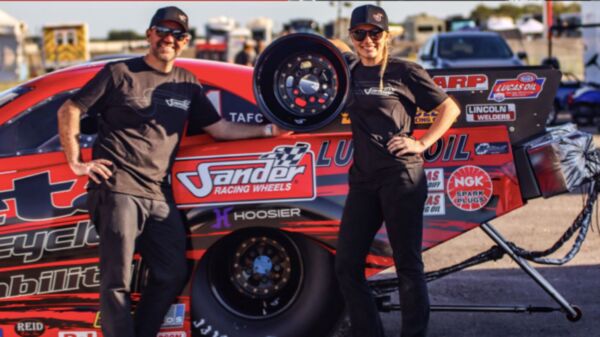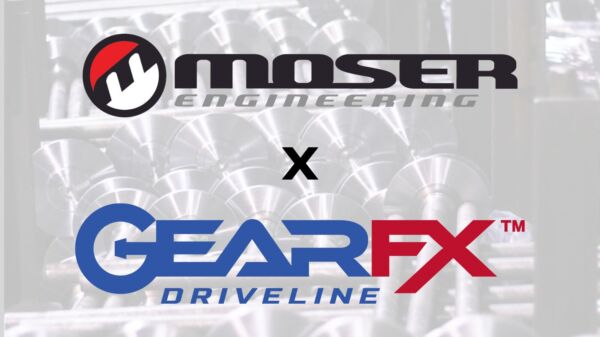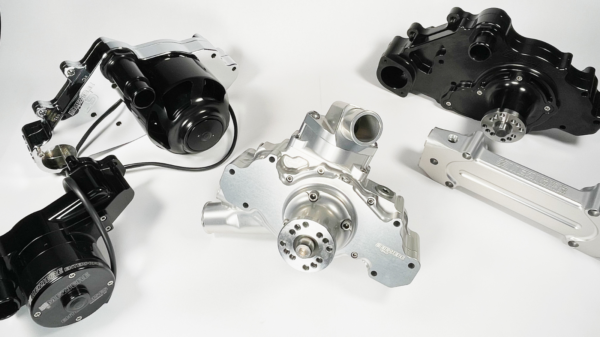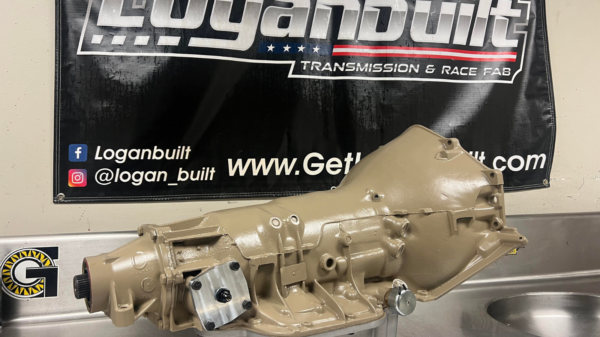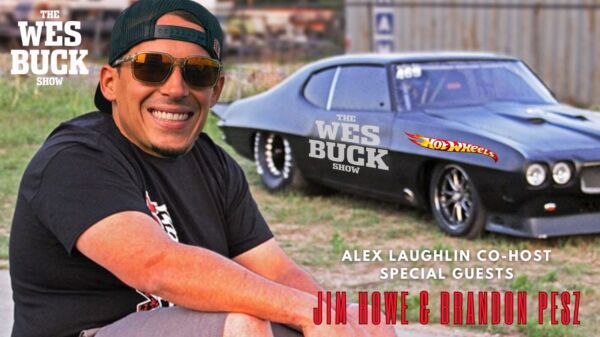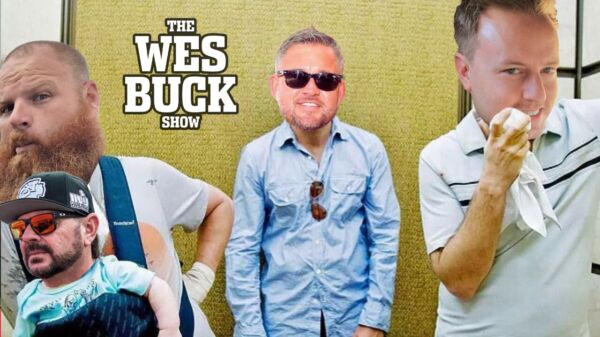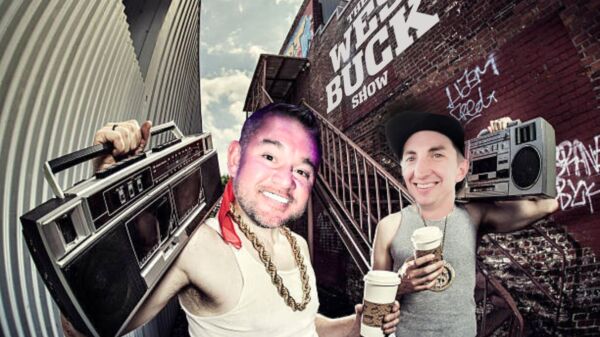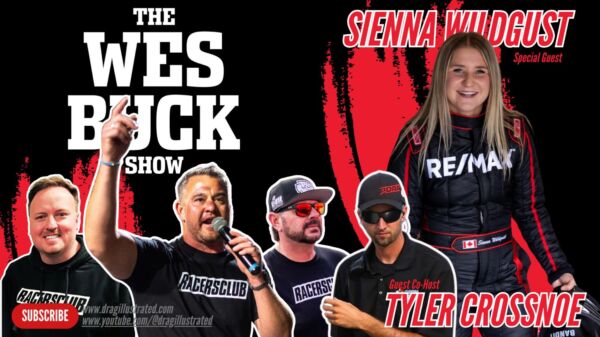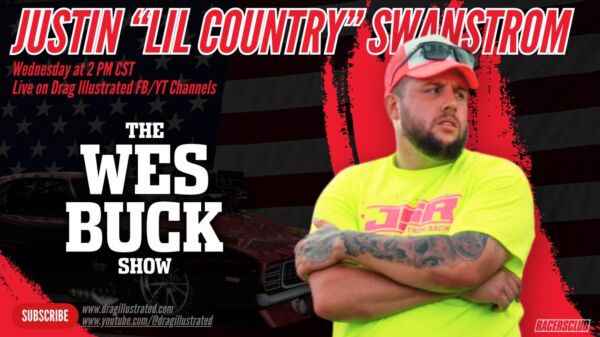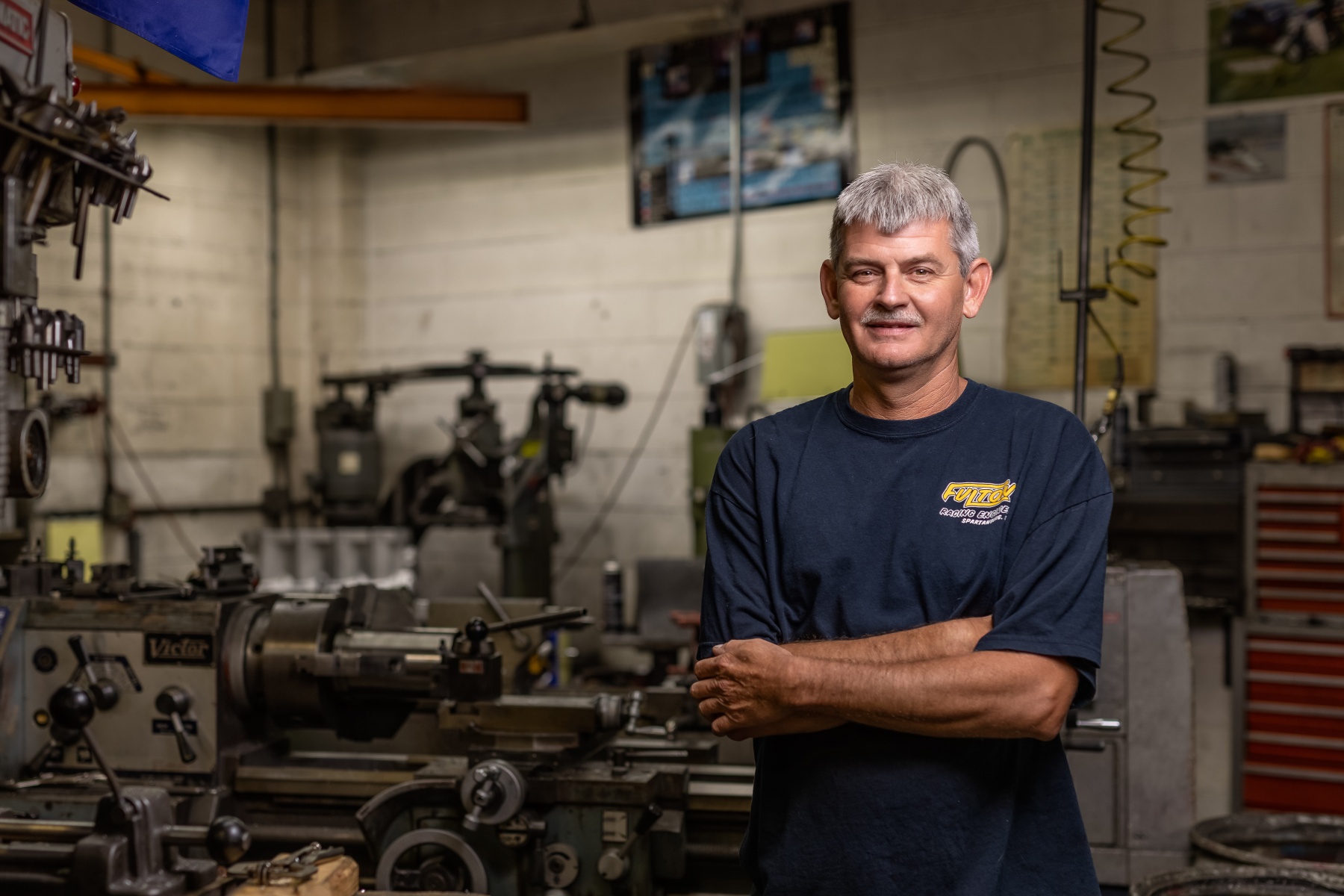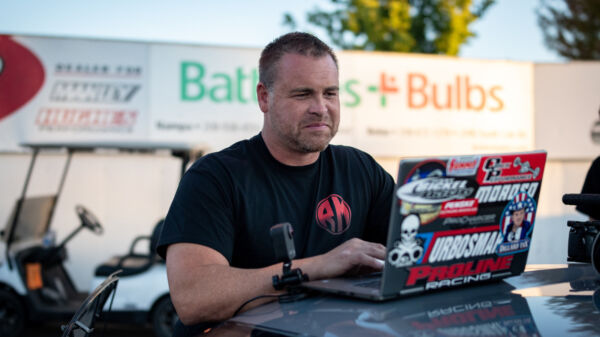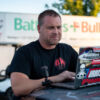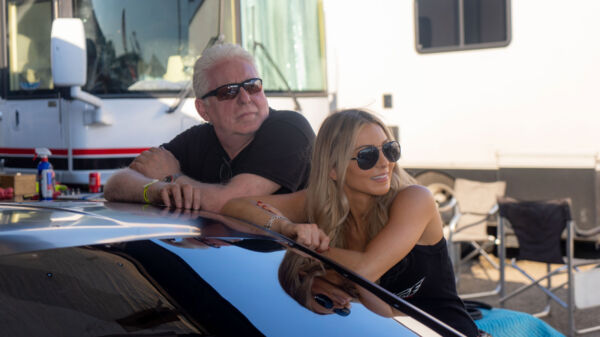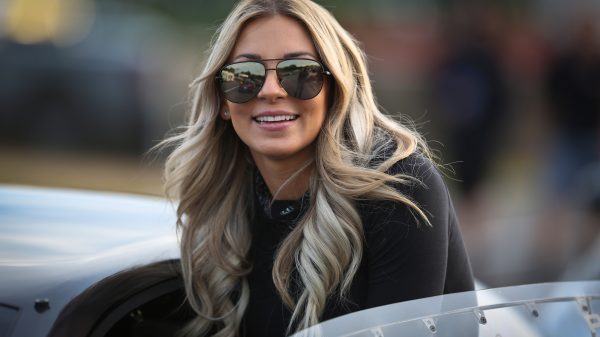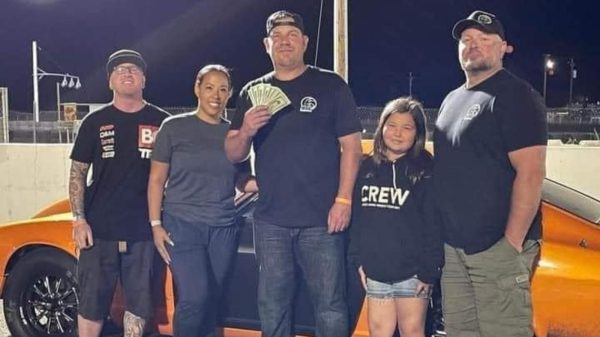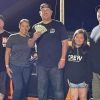Stacy Hall has just returned home from another hectic Monday at Fulton Competition Engines, the engine shop where he’s worked since he was a teenager. It’s a little after 6 p.m., but Hall isn’t entirely done for the day. He’s planning on loading up his ’63 Corvette and the pair of dragsters he and his daughter, Brooke Hall-Gary, race in Top Dragster so the family can head up to Virginia Motorsports Park for the PDRA Summer Shootout after work on Wednesday.
[Editor’s Note: This story originally appeared in DI #177, the Sportsman Issue, in July/August of 2022.]
Racing consumes Hall’s life, and it’s been that way for as long as he can remember. The 52-year-old sportsman racing veteran first met Gene Fulton when he was three years old, as his father, Tommy, started working for and racing with Fulton before Hall was born. When Hall was old enough, he started helping in the engine shop. That led to a nickname that he still holds. It’s one of multiple nicknames, but we’ll get to that later.
“They called me the floor sweeper because back in the day, I was just going around there sweeping the floors and cleaning up machines,” Hall says. “And matter of fact, Bob Harris calls me the floor sweeper to this day, and they tell everybody, ‘We want the floor sweeper to build my motor.’ It’s just a running joke.”
Working at Fulton Competition was a launch pad for Hall’s illustrious yet understated career. As a driver, he’s set small-block records and notched numerous wins, as well as the 2020 PDRA Top Sportsman world championship. As one of the lead engine builders at Fulton Competition, he’s been a behind-the-scenes part of some of the most significant moments in Pro Modified history, like Jim Halsey’s recent three-year stretch of PDRA Pro Nitrous world championships. It all started in that legendary little engine shop in Spartanburg, South Carolina.
“Gene was racing, my daddy was racing, and Daddy quit racing. He built a house and he quit racing and I kept on racing bracket cars, and I started driving a grudge car for some guys up North, and they let me run their car in Top Sportsman for a little while,” Hall remembers. “Then I quit driving the car for them and I built this car I got here. Well, I had another car in between that one. Had a ’41 Willys, too, but I sold it. That’s pretty much how I got here, to make a long story short.”
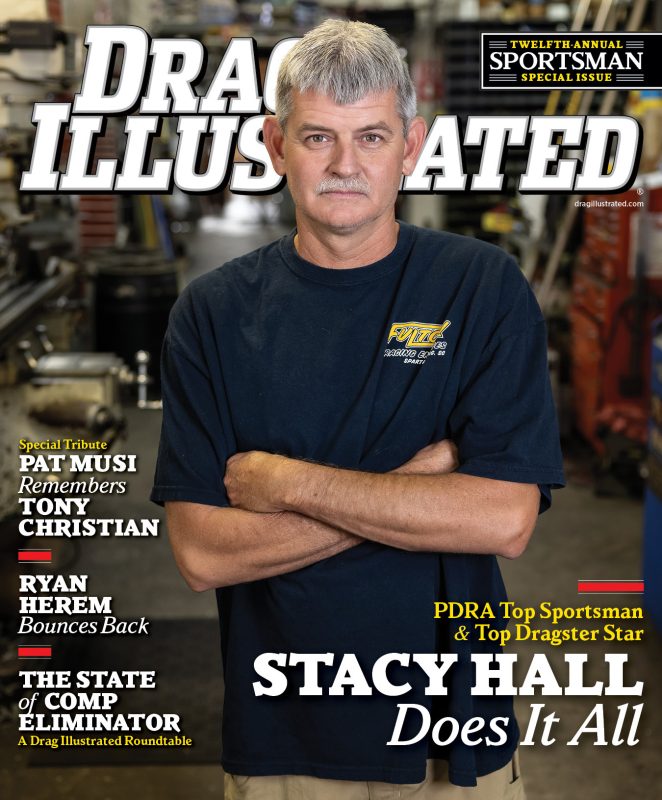 But we’re not here for a short story. We’re here for the long story, and with a bit of coaxing, it’s a story Hall will gladly tell.
But we’re not here for a short story. We’re here for the long story, and with a bit of coaxing, it’s a story Hall will gladly tell.
Hall’s driving career began before he was old enough to drive on the street legally. He still vividly remembers his first pass behind the wheel of his father’s Nova.
“I made my first pass down the dragstrip when I was 14 at Shuffletown Dragway,” Hall says. “I was .01 on the tree, went 7.11. I can remember that to the day.”
While Hall was getting into driving, he had also already spent time in the engine shop getting familiar with the parts, pieces, tools, and machines used to build engines and refine parts. It was an early sign that Hall’s life would be consumed by all things racing.
“When I was in school, I didn’t want to be at school. I wanted to be at that shop,” Hall says. “I was that stupid kid that kept bringing pistons and rods and rocker arms and stuff to the school for a show-and-tell deal. I was that kid.”
He was so up to speed that he essentially tested himself out of high school auto shop after the first day. Like his first pass down the track, it’s a moment Hall quickly recalls decades later.
“There’s a place here where I live called Swofford Career Center,” Hall begins. “When I was in school, 11th- and 12th-grade year, I went up there going to take auto mechanics. The first day I walked in, the auto mechanics guy set us down at a desk and he gave us some paperwork thing to do.
“Well, the next day, he comes in there and he asked us what this was, which was a micrometer. Nobody raised their hand but me. I told him what it was. Well, then he said, ‘You know how to use it?’ I said, ‘Yes, sir.’ He said, ‘Well, come up here and measure this for me.’
“So I measured it for him and told him what it was,” Hall continues. “Well then, I got home that evening and thought, ‘I don’t really know if this man can teach me anything,’ so the next day, I went back to the career center. I walked into the office and I told the dang principal, I said, ‘Look, I’m not trying to be rude, but I don’t think this man can teach me anything that I don’t already know.’ I said, ‘I want to take something that can teach me something,’ so I dropped out of automotive class and went into welding.”
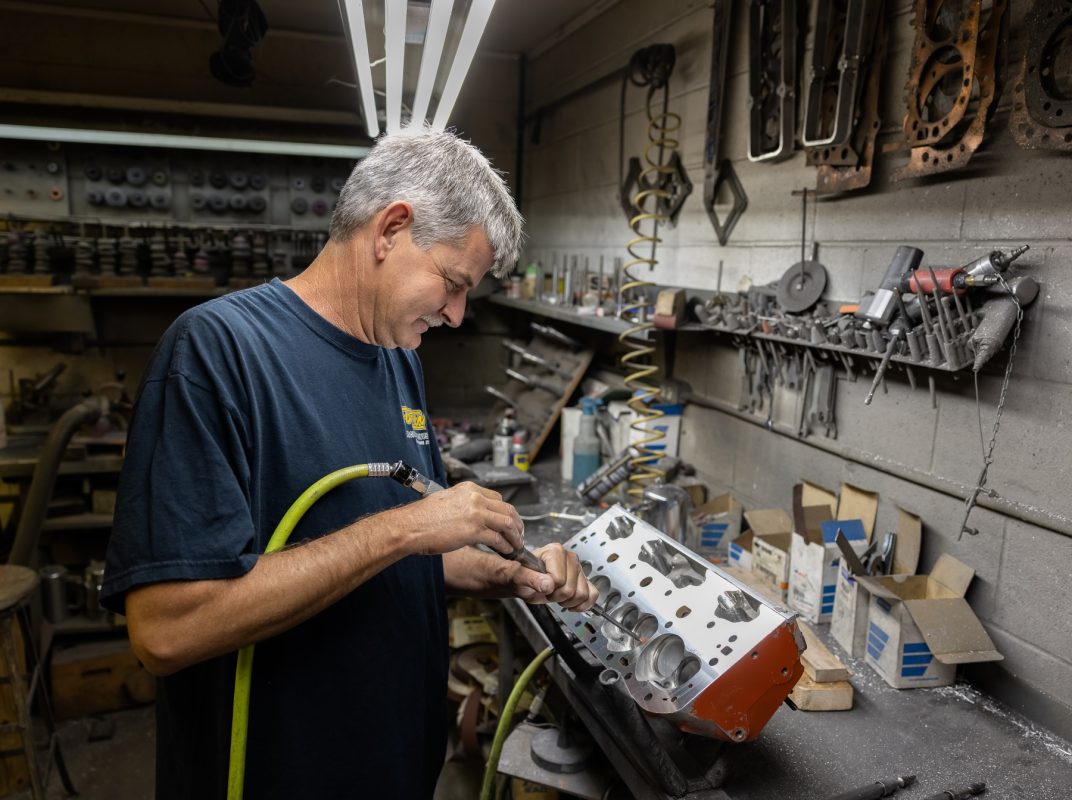
Hall continued bracket racing for some time before getting into big-money grudge racing. His biggest win? “Back in the day when I drove the grudge car for them boys up there, we’d run for a race at Virginia, one run for $60,000. That was a good payday for me,” Hall says.
Class racing was calling Hall, though, and with a different engine combination in the grudge car, he went to run Modified at an IHRA race at Darlington Dragway in 1996. Fulton won four Modified world championships and 25 national events before retiring as a driver in 1987, so the shop had a successful background in the class. But Hall didn’t quite enjoy the same experience his boss did, and his time in the class was short-lived, to say the least.
“I hated it, but I sat in the bleachers and watched the Top Sportsman cars run,” Hall says. “And I said, ‘That’s what I want to do right there.’ I never came back and run Modified again. I went home and changed my whole combination around. The next time I went out, I was running Top Sportsman with them boys.”
It was at those early races in his IHRA Top Sportsman races where Hall’s relationship with his wife, Alison, started. They’d met much earlier, as Alison’s dad, Jimmie Flynt, was a racer and would bring his motors to Fulton’s shop. At the time, Stacy was just “the floor sweeper,” and Alison was one of three giggling girls in the backseat.
“We didn’t see each other for years after that, then I started racing Top Sportsman and she started helping me,” Hall says. “Me and her started hanging out at the racetracks, and one thing led to another, and then here we are 20-something years later.”
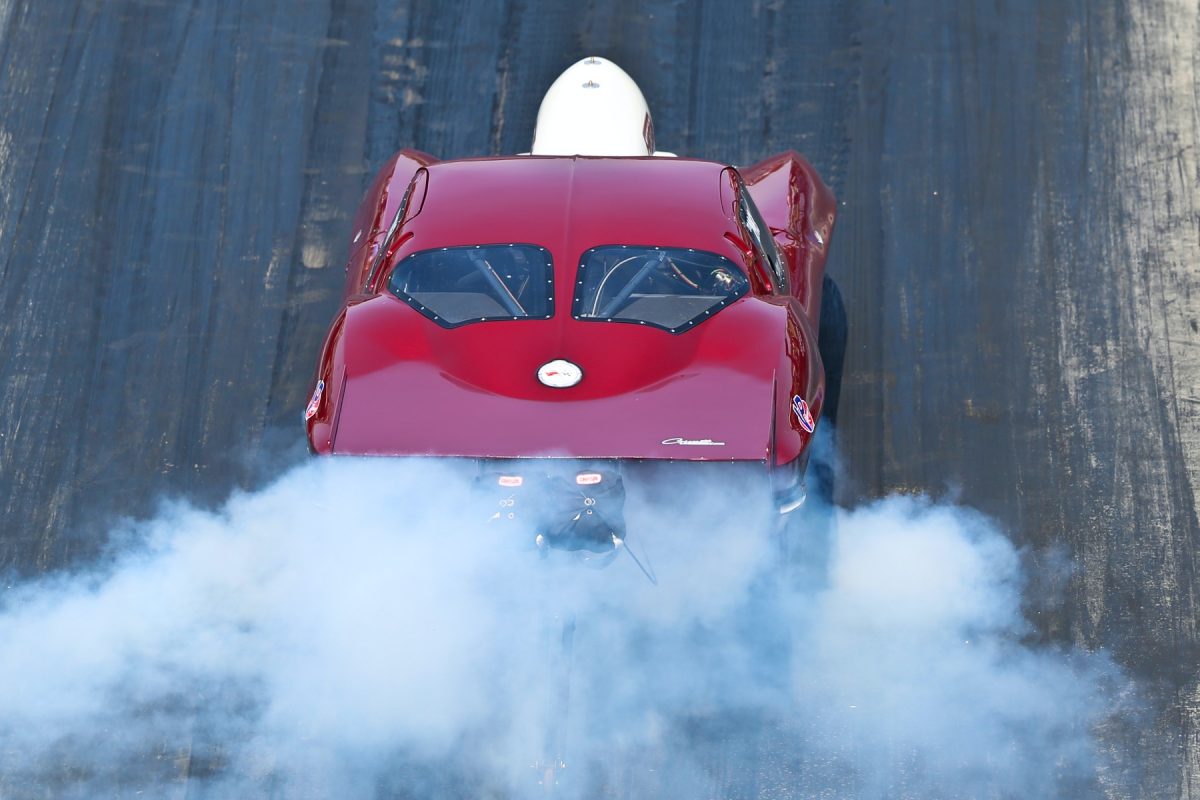
Another one of Hall’s nicknames also developed during this timeframe. “Everybody at the racetrack calls me ‘Biggie’ because for years I ran small-blocks in my car with a clutch and a dang Lenco running Top Sportsman and I was outrunning a bunch of them big-block cars, so everybody started nicknaming me ‘Biggie,’” Hall explains.
Hall wasn’t just outrunning the big-inch nitrous cars. He was setting small-block records. One of his records came at another IHRA race at Darlington. Hall couldn’t get off the starting line in the first three of four qualifying sessions. Another guy with a nickname – the Iceman – saved the day.
“Shannon Jenkins came over and helped me on my car and determined it was the tires,” Hall recalls. “Well, they were running my class and I said, ‘Man, I ain’t got another set of tires.’ Shannon said, ‘There’s a set in my trailer on the wall. Go get them.’ We go get his tires, throw them on my car at the last minute, get up there just in time to make the run, and I went 6.89 straight down Broadway, and the crowd went crazy.
“My wife got down there and she said, ‘You know what you run?’ I said, ‘Probably about 7.10, 7.11.’ She goes, ‘6.89.’ I was like, ‘Ain’t no way.’ That was cool back in the day. It ain’t nothing now, but back then it was.”
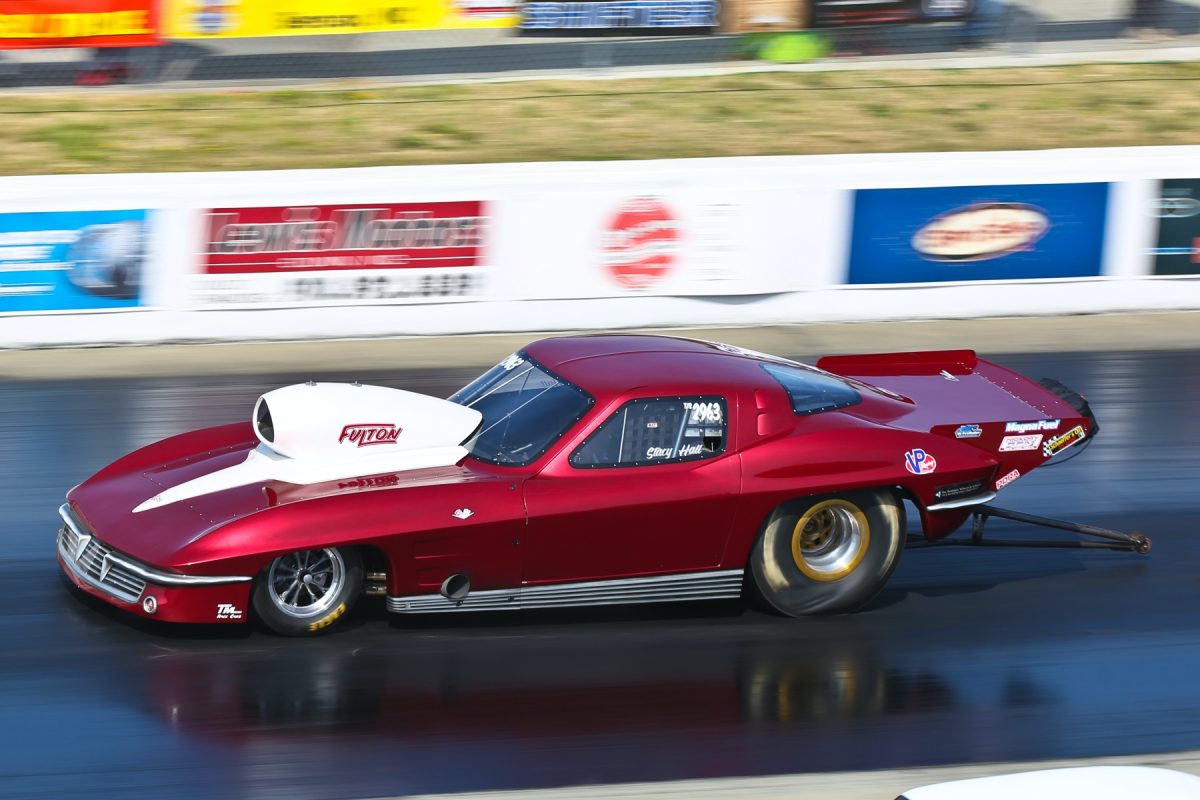
Hall isn’t so concerned with setting records these days – in his own car, anyway. He’s focused on finding continued success in PDRA Top Sportsman, where he holds the distinction of being the first-ever winner in the series. He won the 2014 PDRA Spring Open at Rockingham Dragway, beating Chip Forman, the late Ronnie Davis, and eventual world champion Dan Ferguson on his way to the final round, where he beat William Brown III. It was far from Hall’s first race win, but it didn’t come off that way in the winner’s circle interview.
“I choked at the mic and everybody gives me crap about that too,” Hall laughs. “[Then-PDRA race director] Bob Harris walked up to me, he said, ‘Is this the first time you ever won a race?’ and I said, ‘Yep, first time I ever won a race.’ I meant first PDRA race, but I wasn’t thinking. Heck, it was the first PDRA race.”
At the time, Top Sportsman was one 16-car field. If you weren’t quick enough to make that field, you were heading home. The PDRA sportsman classes have since evolved to include an “Elite” field for the 16 quickest cars, plus a second field of 32 or even 48 cars, depending on how many cars try to qualify. Before PDRA added the second field, Hall admits he took a break from PDRA competition because he couldn’t compete with the increasingly quick cars that were trying to qualify.
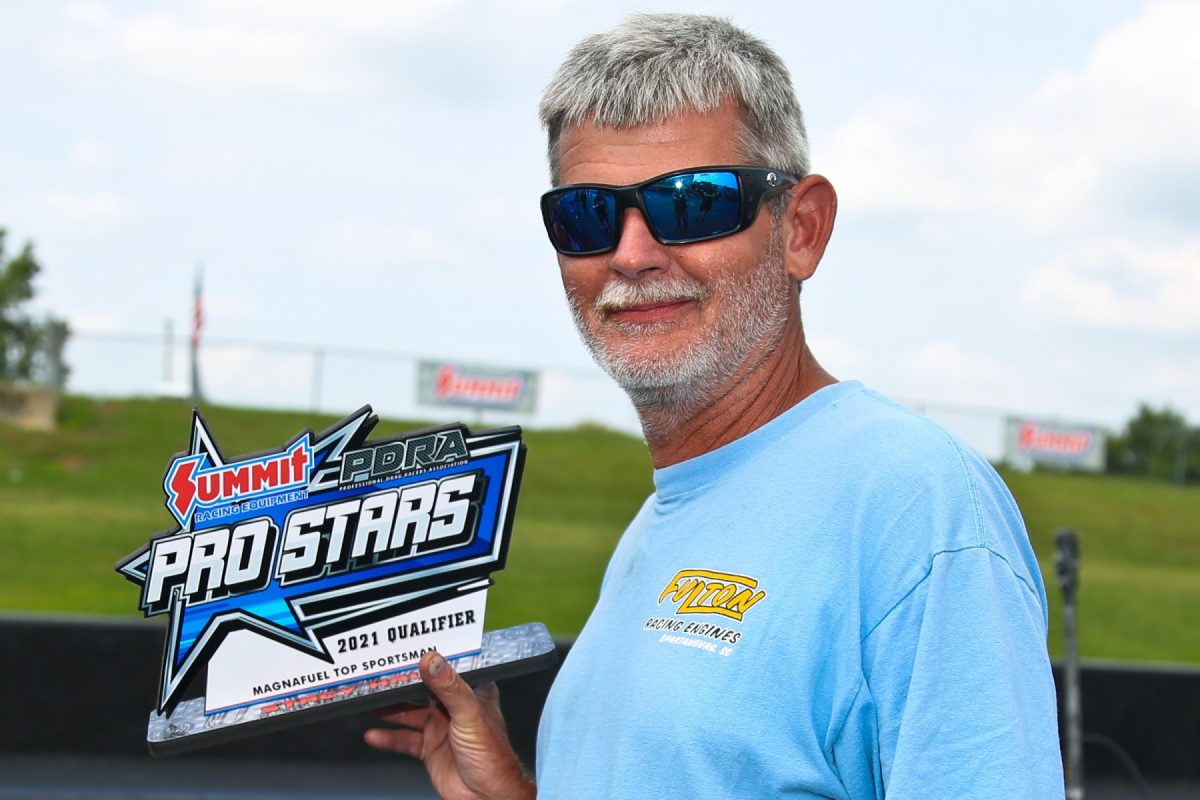 “There for a while, everybody kind of got scared because they wouldn’t qualify, and they didn’t have this option to do the second 32-car field,” Hall says. “All my friends that do what I do, they like that [second field]. And Top Dragster’s really fast because a bunch of them dang ProCharger boys done showed up out there. You better be ready to haul the mail to get into Elite in that.”
“There for a while, everybody kind of got scared because they wouldn’t qualify, and they didn’t have this option to do the second 32-car field,” Hall says. “All my friends that do what I do, they like that [second field]. And Top Dragster’s really fast because a bunch of them dang ProCharger boys done showed up out there. You better be ready to haul the mail to get into Elite in that.”
Hall is perfectly content running his nitrous-assisted ’63 Corvette and his ’21 American dragster in the secondary fields in Top Sportsman and Top Dragster, respectively. The Elite fields frequently require 3-second passes to qualify, and Hall just isn’t interested in making the steps up it would take to run at that level.
“My Corvette is pretty much self-efficient,” Hall says. “I got her set up. She can run on one system, 4.30, .32, .31, right in there. If I need to, I can turn the second one on for just a little bit, go .24, just to make sure it’s in the show good.”
That efficiency allows Hall to go racing with his two cars and the second dragster driven by his daughter while also supporting Fulton’s customers in Pro Nitrous and the sportsman classes.
“I can run that car all year long and do nothing to it except change the oil,” Hall adds. “I’ll change the oil every 30-35 runs and check the valve springs and check the valve lashing and I keep on rocking and rolling, and that’s the way I got the dragster set up, too. And people give me hell about that. ‘You don’t ever have to work on your cars.’ Bubba, I work on this stuff during the week. I do not want to come to the racetrack and work on it.
“Not only that, this happens all the time,” Hall starts. “I’ve been at somebody’s trailer working on a motor and my wife has pulled up on the golf cart saying, ‘Hey, you going to make this run?’ ‘Yeah.’ ‘Well, they’re running your class now.’ ‘What?’ So I had to take off and get the car and haul butt up to make the run. I don’t even have time to work on my own car at the racetrack. But it’s fun.”
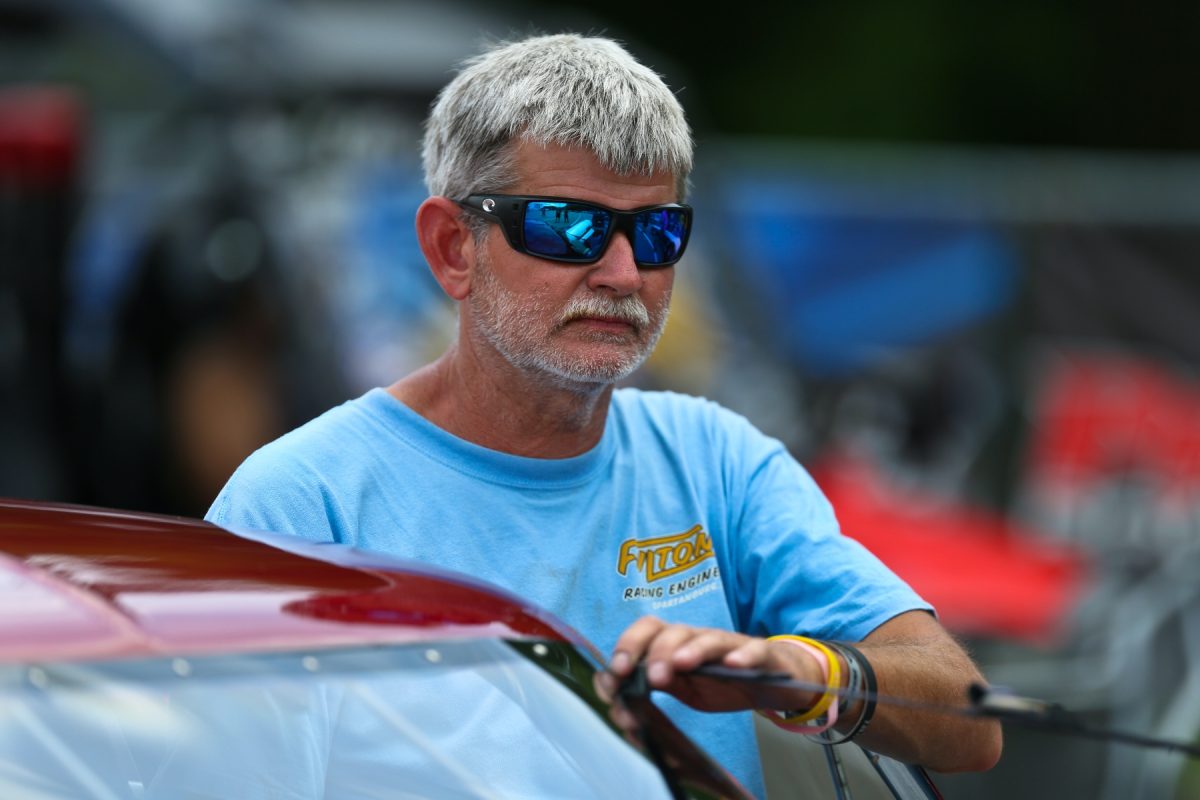
One of Hall’s most significant upgrades over the last several years was actually for himself, not his cars. He had LASIK eye surgery over the offseason going into the 2020 season. Just under a year later, he was celebrating his first PDRA Top Sportsman world championship at the World Finals. When asked if he thinks his improved vision made that much of a difference, Hall answers with an emphatic yes.
“I can see the tree now,” Hall says. “What really made me decide to do that LASIK surgery was I was at Virginia the year before and I made a pass and I got down in the shutdown area and turned off the track. It’s real dark down there in the trees and I pulled my glasses off and laid them on my knee and took my helmet stuff off, and I went back to get my glasses and they were gone.
“Well, then I had to get out of the car, and I’m stumbling around the car and I broke my glasses. So I’m over there at the trailer, fixed them back so I can make the next round, and I was like, ‘You know what? I’m going to see if I can get my eyes fixed this winter,’ so that’s what I did.”
Hall’s family keeps him going when things get overwhelming. When Hall goes racing, he’s almost always joined by his whole family, including wife Alison, daughters Brooke and Treyana, Brooke’s husband, Joe, and Brooke and Joe’s daughters, Lakyn and Josie. The youngest of Hall’s two granddaughters, Josie, was born earlier this spring, so Brooke just recently returned to Top Dragster competition.
Hall realizes how fortunate he is to have his daughters and now granddaughters at the racetrack with him, as Fulton had stepped away from racing before his kids really got the chance to see him race. So, Hall embraces family time when they’re at the races.
“The grandbaby, Laykn, really changed mine and my wife’s life when she came into the picture,” Hall says. “She’ll be five years old on the 23rd of this month. “When I’m in the car strapped in, ready to go, she’ll stick her little face up right at that little hole in the window – ‘Papa, you better win. You better win.’”
Along with his family, Hall credits supporters like Fulton, chassis builder Tommy Mauney, Schaeffer’s Oil, Jack Ford, Trevor Wiggins of GET’M Garage, and buddies like Hank Guyton, Rob Painter, Jeremy Creasman, Michael White, and Brad Taylor.
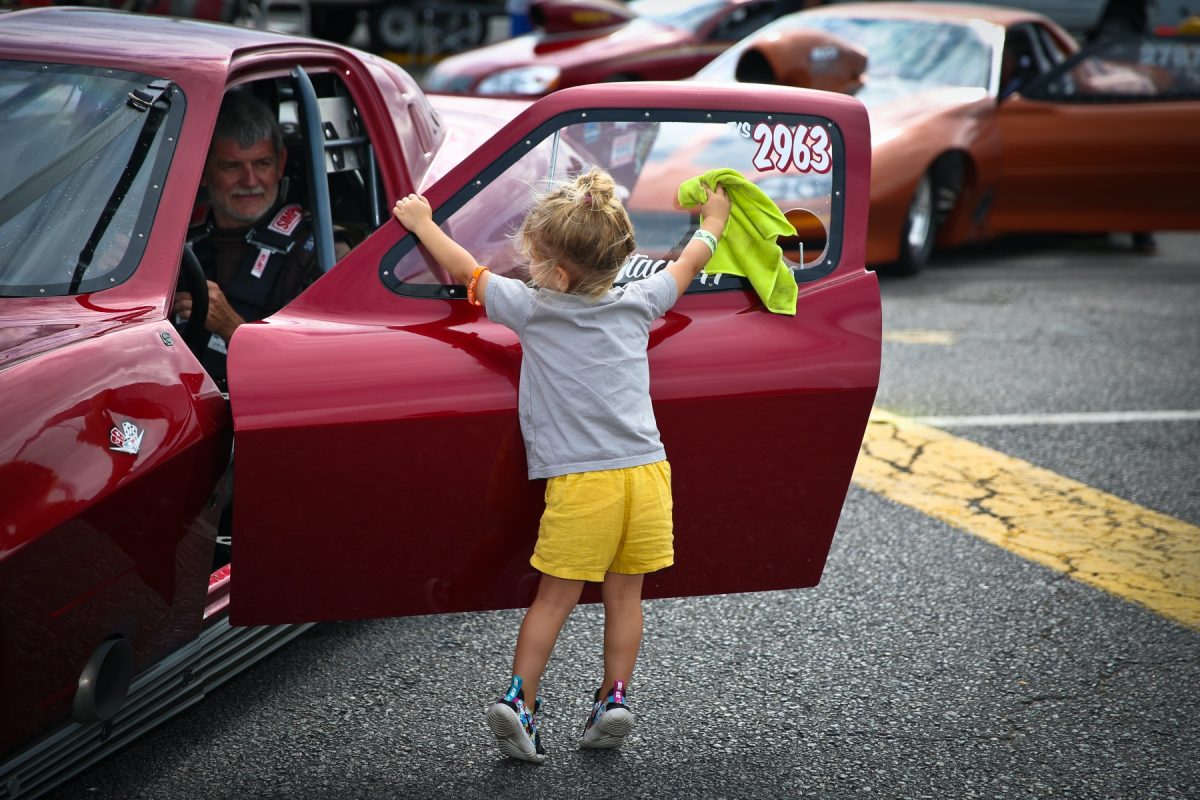
Over the years of working for Fulton, an eccentric 74-year-old who counts skydiving as a hobby, Hall has seen and done it all. Personally, he’s evolved from the “floor sweeper” to Fulton’s right-hand man and the main point of contact for most customers at the PDRA races. Meanwhile, the shop has grown to include customers across numerous different classes, many of which require the latest in engine technology.
“Back when I first started, Gene and them had these dang stock blocks and stock heads and had to build what they could out of what we had for stock stuff,” Hall says. “This stuff we’re doing nowadays, all this CNC billet blocks and heads and all that, I keep telling everybody, ‘When’s it going to stop? When’s it going to stop?’ But it don’t stop. It’s just out of control, man.
“But I like working at the shop,” Hall says. “Like I said, I’ve been there my whole life. Sometimes it can be a real pain in the butt to work for [Fulton]. But he’s 74 years old right now. He’s actually mellowed out in the last couple years.”
The Fulton Competition brand has seen a bit of a resurgence in recent years with the dominant success of nitrous Pro Modified veteran Jim Halsey. He won the last three PDRA Pro Nitrous world championships with a Fulton 959-cubic-inch mill between the frame rails in his Bickel-built “Daddy Shark” ’68 Camaro. Hall says it’s been a real thrill for the shop to be a part of that success, but he’s quick to share the credit.
“It’s not just me or Fulton Competition or the boys at the shop,” Hall says. “It’s a group effort. It’s me, Gene, Tommy [Hall], another boy named David [Greene] that works at the shop, all the Halsey crew: Eric [Davis], Jimmy, Cathy [Crouse-Halsey], Michael [McMillan], Brandon [Switzer], Melissa [Switzer]. It’s a group effort. It’s all of us.”
Hall says the engines typically stay with Halsey between races, as crew chief Eric Davis handles routine service work, then they return to Hall and Fulton for machine work and serious revamps.
Halsey’s performance at the inaugural Summit Racing Equipment PDRA ProStars race last year was one of Hall’s most memorable outings with the Halsey crew. With no qualifying, just one shakedown run before four rounds of eliminations, it wasn’t the ideal time to bring out a brand-new engine. It all worked out, though, as Halsey won the deal.
“We go out there [for the shakedown run], and Jimmy does a burnout and backs up,” Hall begins, “and it’s an all-new motor, all-new lines, and all this stuff. There could be one little major leak. Heck, I’m on the starting line laying down on the ground, looking underneath the car making sure nothing leaks out the car before he staged the thing. He goes out there and the first pass was a .73 or .72. That turned heads right there. Brand-new motor out the shop, first pass, 3.72. Everybody was like, ‘What? Come on now.’
“But that was pretty thrilling, to take a brand-new motor and throw it in a car and see her first pass right down Broadway,” Hall continues. “There’s a lot of people that won’t do that. They’ll go out there and make a half-track or 60-foot just to make sure everything’s cool and get a baseline tuneup. But Brandon [Switzer], when it comes to tuning a car, Brandon’s top-notch, Bubba. He is the best.”
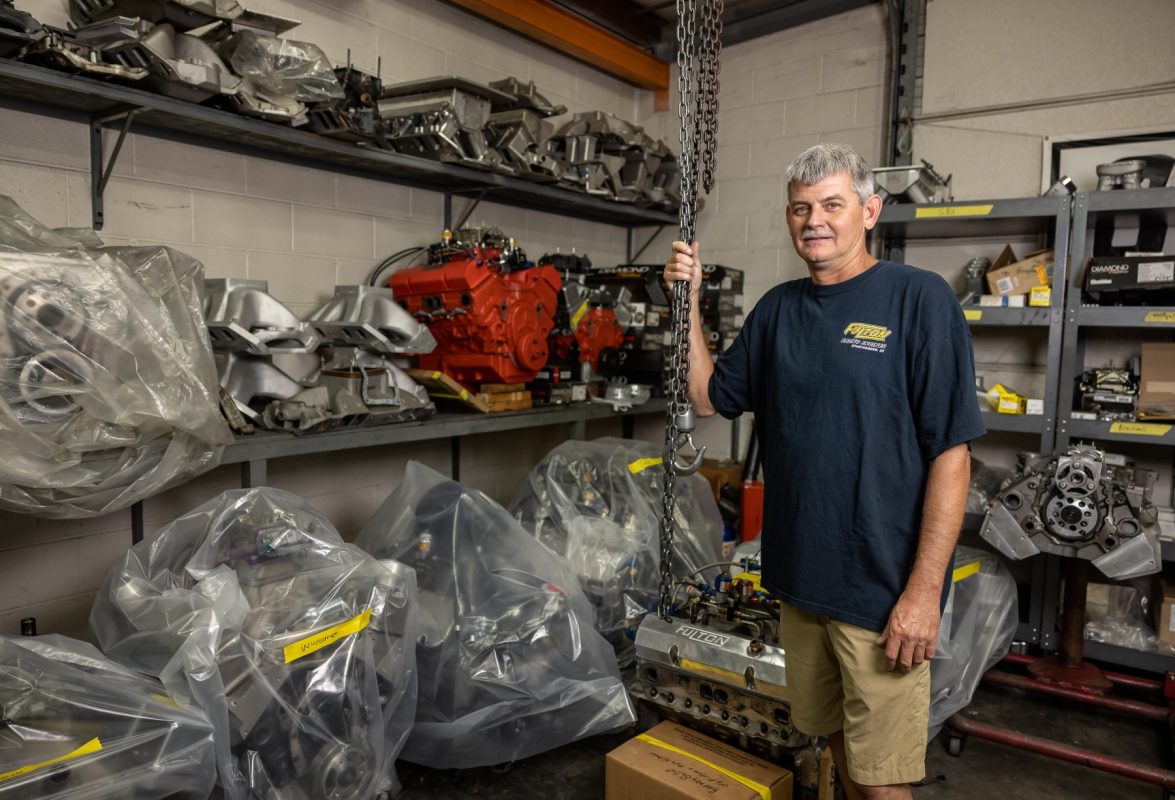
Hall has had a front-row seat to The Halsey Show over the last few years, and he’s seen the effort that led to a slew of wins, No. 1 qualifier awards, the three world championships, and the title of quickest and fastest eighth-mile, big-tire, nitrous-assisted Pro Mod.
“They’re a tight-knit group, but when they get to the racetrack, they’re there to win the race and do what they supposed to dang do. It’s like a job to them,” Hall says.
Hall has known Halsey and his crew for many years, as Halsey has been a longtime Fulton customer, but the team’s recent run in PDRA Pro Nitrous has brought Hall closer to the group. They work well together at the track, and they’re good friends away from the track.
“They let me come in their pits and help them do whatever they need to do,” Hall says. “It’s been an honor. A lot of people won’t do that. I got some customers out there; they don’t want me around. They don’t want me to know what they got in their car, what they got in their tuneup, you know what I mean?
“They’re good people. They really are nice people. My mama died June the 4th, and Cathy and all of them sent flowers and everything. That meant a lot to me.”
Seeing Fulton’s customers find success and jumping in the occasional winner’s circle picture is the reward for all of Hall’s work at the shop. He’ll take a bare block and handle nearly every step involved in building a complete 959-cubic-inch engine ready to go to Brandon Switzer’s shop about an hour up the road in Denver, North Carolina.
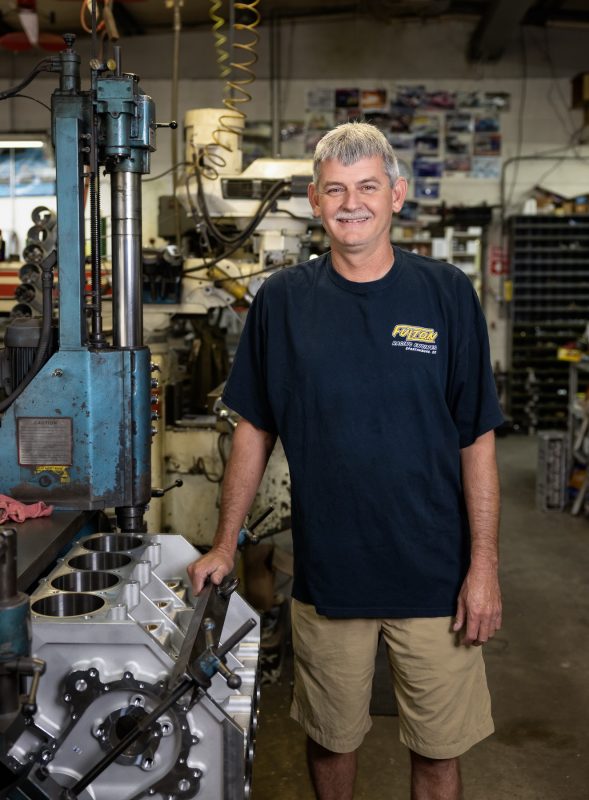 “I do a lot of machine work at the shop,” Hall says. “I do all the block work, and Gene does a lot of the head work. I cut all the heads and stuff like that. Gene normally does the final assembly on heads and stuff. I do all the honing. I do a lot. Too much, really, and sweep the floor still.”
“I do a lot of machine work at the shop,” Hall says. “I do all the block work, and Gene does a lot of the head work. I cut all the heads and stuff like that. Gene normally does the final assembly on heads and stuff. I do all the honing. I do a lot. Too much, really, and sweep the floor still.”
It can be an advantage, as Hall gets to do all of his own engine work for his cars, and he’s surrounded by some of the best mechanical minds in the industry. But once again, racing is an all-consuming lifestyle for Hall, and it can understandably get overwhelming at times.
“I tell people all the time, ‘Would you like to be at your job 24/7?’ ‘No.’ I said, ‘Well, I’m at my job pretty much 24/7,’” Hall points out. “I work every day at the shop. I go home. I’m working on stuff in my shop. Then I go to the racetrack. I’m still surrounded by racing stuff. I never get a break. Never.”
But Hall realizes it’s his own actions that led to this unique way of life, and quite honestly, it’s probably exactly what the 14-year-old version of Hall envisioned after he made that first pass down Shuffletown Dragway’s now-abandoned eighth-mile strip.
“That’s the life that I got thrown into and chose,” Hall confirms. “It’s been a pretty good life to live, and I’ve had a lot of fun, met a lot of good people, and it could be worse. Could be working a regular job, not doing any racing or anything like that.
“I’m just an old country boy. My mom didn’t have a whole lot of money when she was coming up, and my daddy didn’t either. And heck, I still don’t really, but I’m just fortunate enough to ride this rollercoaster.”
